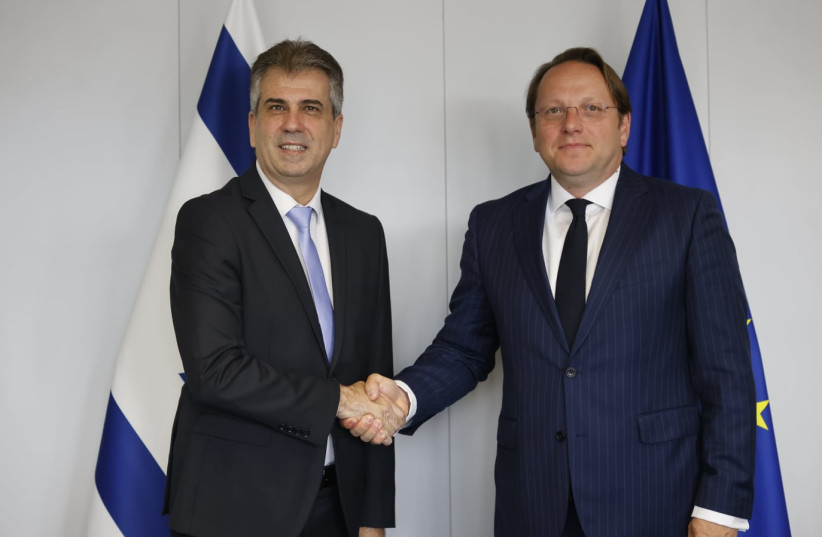Cohen, Borrell plan Israel-EU summit in Jerusalem
An EU-Israel summit will likely be held in Jerusalem this year, after Foreign Minister Eli Cohen and EU High Representative for Foreign Affairs and Security Policy Josep Borrell defused past tensions in a long meeting in Brussels on Tuesday.
Cohen barred Borrell from making an official visit to Israel in March, after the latter wrote a blog post in which he appeared to equate Israeli terror victims with Palestinians killed by the IDF and Hamas’s refusal to recognize Israel’s existence to coalition politicians opposing a two-state solution. The two spoke on the phone at the time, and Cohen called the comparisons unacceptable.
The foreign ministers met for over 2.5 hours, including a one-on-one meeting lasting over an hour, from which they emerged saying they will open “a new page in EU-Israel relations,” a source in Cohen’s delegation said.
What is planned for the meeting?
Borrell and Cohen plan to hold a meeting of the EU-Israel Association Council, a body meant to ensure dialogue and strengthen relations between the countries, this year, which will likely take place in Jerusalem.
The council did not convene in 2012-2022, with Israel canceling in 2013 in protest over an EU decision to differentiate between settlements and the rest of Israel in all agreements, and the EU not agreeing to hold further meetings in protest over policies toward the Palestinians.
 Foreign Minister Eli Cohen with European Commissioner for Neighbourhood and Enlargement, Olivér Várhelyi, May 2, 2023. (credit: JOHANNA GÉRON)
Foreign Minister Eli Cohen with European Commissioner for Neighbourhood and Enlargement, Olivér Várhelyi, May 2, 2023. (credit: JOHANNA GÉRON)Borrell condemned Palestinian terrorist attacks on Israel, including the rockets fired from Gaza on Tuesday, the source said.
Cohen asked Borrell to unequivocally condemn the Palestinian Authority’s practice of paying terrorists a monthly stipend after the attack Israel.
The foreign minister also called on the EU to advance sanctions on Iran.
“This is the time to stop a nuclear Iran,” Cohen said.
Earlier, Cohen met with European Parliament President Roberta Metsola, who backed a resolution passed in January calling on the European Council and member states to add the Islamic Revolutionary Guard Corps to the EU terrorist list, banning financial activity related to the IRGC and its affiliates. Cohen and Metsola discussed ways to turn the resolution into action.
“The Iranian regime threatens the Middle East and the Western world,” Cohen said. “European states understand the Iranian threat today more than ever and see eye-to-eye with Israel on the need to fight the terrorism that the Iranian regime leads and funds.”
Cohen wants to secure EU support against Iran
Ahead of the trip, Cohen said that his priority is to secure the EU’s support against Iran. Tehran’s alliance with Moscow has bolstered Jerusalem’s case in Brussels against the Islamic Republic’s pursuit of nuclear weapons.
European Commissioner for Neighborhood and Enlargement Olivér Várhelyi promised Cohen that the EU will make sure it is not funding Palestinian textbooks that incite against Israel.
Várhelyi froze EU funds to the PA in the past over antisemitism and incitement in textbooks.
“Israel does not oppose aid to the Palestinian Authority, but we will not allow a situation in which those funds indirectly fund terrorism or incitement against Israel,” Cohen said.
Várhelyi also said the EU will fund additional research on incitement and antisemitism in Palestinian Authority textbooks, following a previous paper on the topic from 2019, according to Cohen’s office.
In addition, the senior EU official and foreign minister agreed to work together to strengthen and expand the Abraham Accords, forged between Israel and the United Arab Emirates, Bahrain and Morocco in 2020.
Israel and the EU also plan to work together on sweeping mines in Ukraine.
Cohen also participated in an event honoring the Federation of Jewish Communities in Ukraine and their work with Chabad representatives and rabbis to save lives in the war-torn country, with support from the European Commission.
Várhelyi, Metsola, Executive Vice President of the FJCU Rabbi Raphael Rutman and FJCU Representative to the UN Rabbi Levi Matusof were also in attendance.
Among the actions depicted in a photo exhibit at the event was the distribution of food baskets, medicine and other humanitarian measures to Jewish and non-Jewish Ukrainians.
Metsola said the FJCU was “at the forefront” of helping Ukrainians.
“We are talking about various actions such as evacuating civilians, including Holocaust survivors, providing meals and medicine, and what is perhaps the most symbolic of their actions: the use of synagogues in Ukraine as aid centers where volunteers worked,” she said.
Ukrainian ambassador to the European Union, HE Vsevolod Chentsov, mentioned the recent Russian attack on Uman, a pilgrimage site for thousands of Jews each year to Rabbi Nachman of Breslev’s grave.
“I say thank you to the Federation of Jewish Communities: you helped us a lot to survive this winter. I also want to thank the State of Israel – I am sure that together, hand in hand, we will move forward, we are on the right side of history – we will win this war,” Chentsov said.
Rutman cited the Talmudic adage that “saving a human life is equivalent to saving an entire world. Thanks to the support of the European Union, we have saved tens of thousands of worlds and we continue to do so with all our might.”





Comments are closed.